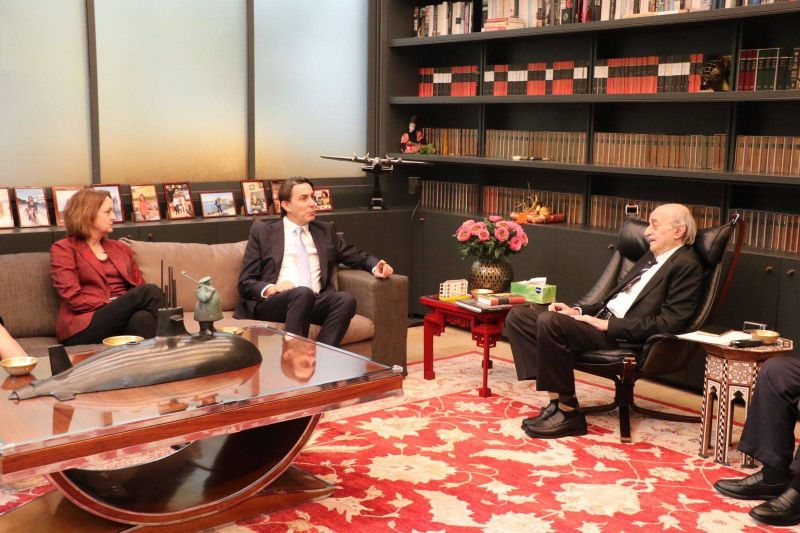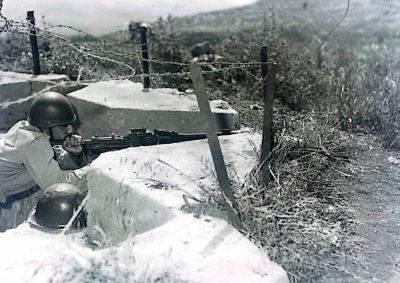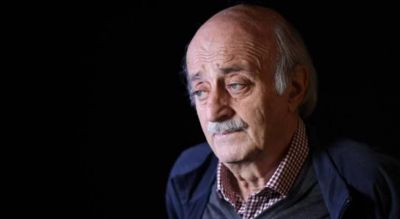
Druze leader Walid Jumblatt talking with American envoy Amos Hochstein, at Clemenceau, Mar. 4, 2024 (Photo provided by the Progressive Socialist Party).
BEIRUT — Druze leader Walid Jumblatt questioned the consistency of US diplomacy toward the ongoing conflict in Lebanon and Gaza in a post published Tuesday on X, writing: "If [US] Vice President Kamala Harris is advocating for an immediate cease-fire in Gaza, why isn't President Joe Biden's special envoy Amos Hochstein doing the same for Lebanon?"
Jumblatt believes that in order to avoid cross-border fighting between Hezbollah and Israel escalating into a full-scale war, a cease-fire needs to be imposed in Gaza first.
"To achieve lasting stability on the southern border, the international community cannot press to impose [on Lebanon] the withdrawal of Hezbollah [to the north of the Litani River] without negotiating the 1949 armistice," the former Progressive Socialist Party leader said during a meeting with Hochstein on Monday at Clemenceau.
This was the first time the American envoy, who has visited the country numerous times since the outbreak of the Gaza war, expanded his meetings to include Jumblatt and other opposition figures.
On Wednesday, Walid Jumblatt spoke to L'Orient-Le Jour about his initial assessment of the two politicians' discussions.
OLJ: What conclusions did you draw from your meeting with Amos Hochstein?
Jumblatt: The Americans are calling for a cease-fire in Gaza. But at the same time, food aid is being thrown into the sea. This means that, despite international pressure, the war continues. We can't impose conditions for a cease-fire, which is why the all-powerful United States seems powerless.
In Lebanon, too, the Americans can't impose a cease-fire without negotiating the 1949 armistice. In my opinion, this agreement is still very valid. And this is a point I made at the meeting with Hochstein.
(The 1949 armistice is a text signed between Israel and Lebanon after the first Arab-Israeli war, following the proclamation of Israel in May 1948. It stipulates that "the demarcation line behind which the respective armies of each country shall withdraw shall follow the international border between Lebanon and Palestine," in reference to the route negotiated between Paris and London in 1923, known as the Paulet-Newcombe agreement. Both countries are supposed to limit themselves to a small military presence in the border region.)
OLJ: What do you mean by "negotiating the 1949 armistice"?
Jumblatt: The armistice clauses imply the deployment of regular armies on both sides of the border. If the Americans and Israelis want Hezbollah to withdraw to a distance of 10 or 12 kilometers north of the Litani River, Hezbollah too is entitled [at this stage, as the party is part of Lebanon's defense system] to demand an end to the assassinations and daily violations of Lebanese airspace — until the armistice is implemented. But of course, all this would have to be coordinated and planned with the Lebanese state.
OLJ: You were one of the first to warn against an all-out war in Lebanon. Today, the Americans are expressing similar fears.
Jumblatt: The Americans are expressing the Israeli position. They are worried about the Israelis who have left their homes. In the same way, we are concerned about the 100,000 Lebanese who had to leave southern Lebanon after the massive destruction of villages [following Israeli strikes.] We have to look at things from a middle ground.
OLJ: How can we avoid war?
Jumblatt: All we have to do is start where we left off in 2006. After the July war, there was a fait accompli and Resolution 1701 was adopted. Today, the Americans want this text to be applied and the army to be deployed in the South. That's fine by us. We agree with them on this point. But I asked Hochstein whether the United States could increase its [financial] aid to the army. He responded by saying that, at the moment, he won't be able to pass such a proposal through Congress. Why not? I don't know. It's very odd.
OLJ: Why do you think the American envoy met opposition representatives for the first time?
Jumblatt: To hear the other side of the story.

